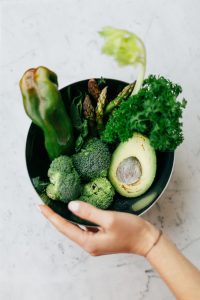
When we eat foods containing all the ingredients we need, the self-repair mechanism in our cells function normally to prevent disease, and the immune system can effectively protect us against dangerous infections from pathogens and immune system disorders. Whole plant foods contain adequate amounts of phytochemicals and antioxidants to adequately fuel these systems.
Some whole foods however, have more disease-protective nutrients than others, and when health goals include preventing cancer or other serious disease, incorporating these foods into the diet, can greatly reduce the risk of serious life-altering illness.
Using an acronym such as G-BOMBS is a great way to remember some of these life-giving foods, and represents Greens, Beans, Onions, Mushrooms, Berries and Seeds. These foods have long been in the scientific literature for being high in various nutrients and phytochemicals, that are cancer preventive.
Green vegetables contain more micronutrients per calorie than any other food, and they contain the most plant protein per calorie, as well as containing nutrients such as folate, calcium and even small amounts of omega 3 fatty acids. Eating lots of green vegetables have also shown to reduce the risk of cardiovascular disease.
Cruciferous vegetables contain other compounds that can not only protect against all kinds of cancers, but also to support the regulation of hormones, weight balance and improve detoxification processes through the liver. Eating plenty of Broccoli, Brussel Sprouts, Cabbage, Cauliflower, Kale, Radishes and Turnips, will set you on the path of excellent health.
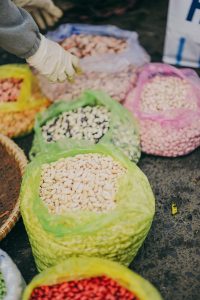
Beans and Legumes are some of the most nutrient-dense, complex-carbohydrate and plant based protein sources. Unlike animal protein, beans do not promote unfavourable cancer-promoting hormones, but are packed full of micronutrients and fibre, supporting weight and glucose balancing and cancer prevention. They are also high in starches that become food for the healthy bacteria in the digestive system. Having a healthy digestive system is important for so many body functions, including brain health, immune system health, and nutrient absorption. Any foods that contain starches, especially resistant starch, becomes food for these important microbes, and are called pre-biotics. Probiotics are the microbes themselves, and pre-biotics are their food sources. Anti-biotics is any form of chemical that will destroy the microbes, which is why many people will suffer with digestive complaints when they take anti-biotics prescribed by doctors.
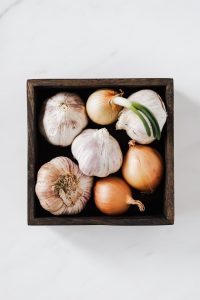
Onions and the rest of the allium family, consist of leeks, garlic, chives, and shallots, and are also powerful pre-biotic foods, as well as being cancer fighters, glucose regulators and immune system boosters, due to their anti-microbial effects. There is also research to suggest an increase in benefits in reducing instances of lower gastric and prostate cancers, because they contain compounds that detoxify carcinogens, halt cancer growth, and block angiogenesis (the growth of new blood vessels that can supply cancer cells with nutrients).
Mushrooms have unique compounds that influence human health and immune function. Cancer cells secrete angiogenesis promoters to secure a robust blood supply, and mushrooms are rich in compounds that inhibit this angiogenesis process. Angiogenesis promoters are also secreted by fat cells, to enable fat growth on the body, and mushrooms inhibit the growth of fat on the body through this same mechanism.
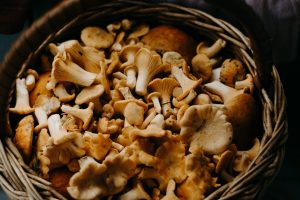
White, Cremini, Portobello, Oyster, Shiitake, Maitake and Reishi mushrooms all have anticancer, anti-inflammatory and immune system promoting properties. Some prevent DNA damage, slow cancer growth and cause programmed cancer cell death.
Mushrooms also contain aromatase inhibitors, which can limit the production of oestrogen and protect breast tissue from excess oestrogen stimulation. Note that mushrooms should always be cooked and not eaten raw, to destroy a mild toxin called agaritine.
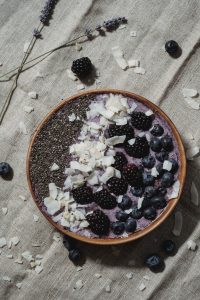
Berries such as blueberries, strawberries, raspberries, and blackberries are true superfoods due to their high anti-oxidant value, low sugar, and high nutrient content, including phytochemicals and flavonoids. Flavonoids affect gene expression and detoxification, inhibit cancer cell growth, hinder inflammation and other processes relating to cancer and heart disease.
Several studies have shown that high flavonoid consumption have significantly lowered the risk of heart disease by up to 45%. Berries, cherries and pomegranates act in several ways to maintain heart health, including reducing inflammation by improving blood lipid levels, blood pressure by reducing plaque formation and reducing blood glucose levels. These same flavonoids have also shown to be protective against cancer, by preventing damage to genetic material and slowing the growth of cancer cells.
Antioxidants provide cardio-protective and anti-cancer effects, and stimulates the body’s own antioxidant enzymes, reducing the instances of diabetes, cancers, and cognitive decline, when consumed regularly.
Berries are also excellent brain food, as they reduce oxidative stress and improve communication between brain cells. There is also evidence to suggest a reduction in cognitive decline, learning and memory decline in an elderly population, when given a wild blueberry juice as a daily supplement. A food that can be incorporated easily into the daily diet, with health benefits to boot, berries deserve their title as a “Superfood”.
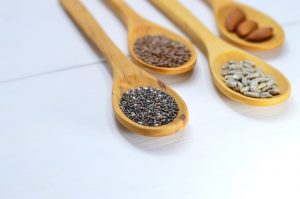
Seeds and Nuts are rich in a spectrum of micronutrients including phytosterols, minerals and antioxidants. Healthy fats in nuts and seeds also aid in the absorption of micronutrients when eaten with vegetables. Countless studies have demonstrated the positive effects in relation to cardiovascular benefits. They also aid in weight maintenance and diabetes prevention. Seeds are abundant in trace minerals and are generally higher in protein than nuts. Flaxseeds, Hemp and Chia seeds are also excellent plant sources of Omega 3 fatty acids, aiding in reducing inflammation. Lignans found in these seeds also have strong anticancer effects. Kale and broccoli also contain these same lignans, but not in as high a concentration.
Lignans inhibit the production of aromatase, an enzyme that converts other hormones into estrogen and estadiol, lowering serum estrogen levels. Plant lignans also blunt the effects of estrogen, and in a study conducted on 48 postmenopausal women, consuming ground flaxseeds daily for a period of six weeks, significant decreases in estradiol, estrone and testosterone were noted. This is particularly significant for women who are overweight, as fat cells produce more oestrogen, increasing the risk of breast cancer. Many of these lignan high foods, are also high in vitamin B9 (folate), a nutrient that is heavily utilised by the liver, in excreting hormonal metabolites and waste products. When these metabolites fail to be cleared effectively, the risk of cardiovascular disease and cancer also increases.
Of course, just about every vegetable and whole food could be called a “superfood”, and when the body is fuelled daily with nourishing foods and drinks, disease has no place within it. Despite all the advancements and understandings of the human body, the amount of disease in western countries does not seem to be declining. The rates of mental health problems, spectrum disorders, Alzheimer’s, cardiovascular diseases and cancer, are higher than ever before. The statistical data states that we are living longer, but are we really living, or just existing?
Fast food and most processed foods, are made with harmful chemicals and additives, and often use oils that are highly inflammatory such as the cancer causing Palm oil, usually appearing on food labels as “vegetable oil”. These are not whole foods. As a society, we seem to have lost the skill of cooking, and with it our taste buds have become dulled to the chemicals in processed foods. Farming practices have changed dramatically over the past 50 years, with high amounts of pesticides and herbicides used in agriculture, without any concern for the health effects on the people who are consuming them. Disease comes from dis-harmony in the body. It is not bad-luck or bad genes. While genetics may make a person more susceptible or vulnerable, it is poor diet and poor lifestyles that cause these genes to activate. The thought of young woman having their breasts removed for fear of a breast cancer diagnosis, due to testing positive for the BRCA gene, shows that the medical system seems to be lacking a whole lot of knowledge on disease prevention. Their work is usually reactive, and hardly ever proactive or preventative. When a cancer patient changes their diet and lifestyle, embarks on the guidance of a natural health practitioner, and begins to thrive, oncologists will often laugh or dismiss their good health, even when they live far beyond their original diagnosis. Sometimes they will even take the credit for the success of their patient, saying that their poisonous chemotherapy treatments did their job very well- all this despite thousands of other patients losing their battles with the same cancer, and the same chemotherapy treatments.
Good health is not good luck. Good health comes from living life well, enjoying wholesome nutrient rich food daily, laughing often, sleeping deeply for at least 7-8 hours per night, and from daily movement, to exercise the heart, move the lymphatic system, breathe fresh air and build strong muscles and bones. Annual blood testing, nutrient and heavy metal testing, also can play a significant part in keeping disease away, especially if diet and lifestyle have not always been so good in the past. Good health can be achieved, and food can be thy medicine, and it can be easier than you think. Delete those fast food apps, and get back into the kitchen. It is not a chore, but part of life. Fill your fridge, freezer and pantry with healthful foods, and you will never run short of something good to eat. Not only will you feel better, sleep better and have more energy, but you will reduce your risk of serious disease exponentially. If you are not sure where to start, seek guidance from a Nutritionist, a cookbook, a cooking class, or ask Google for some cooking tips or cooking videos. You can do this! Eat yourself to better health, one bite at a time.
